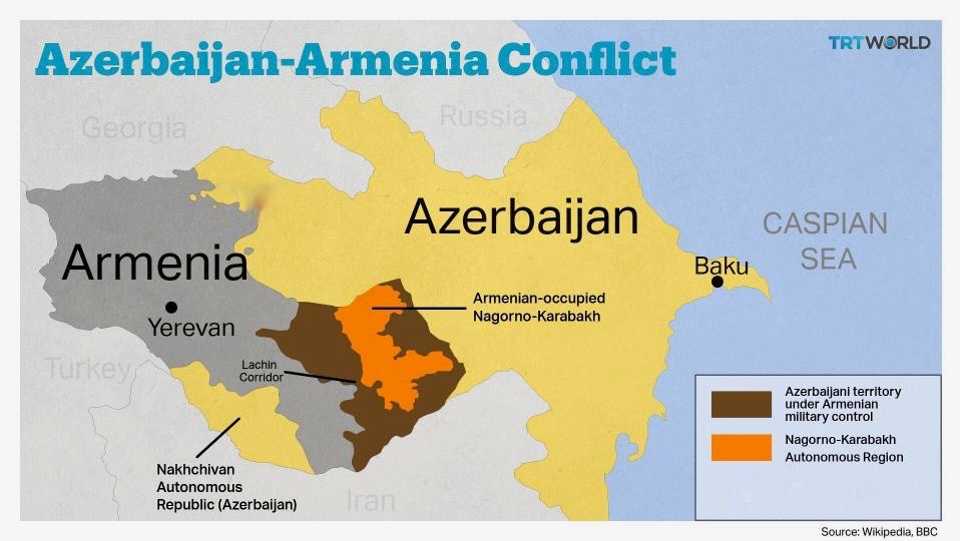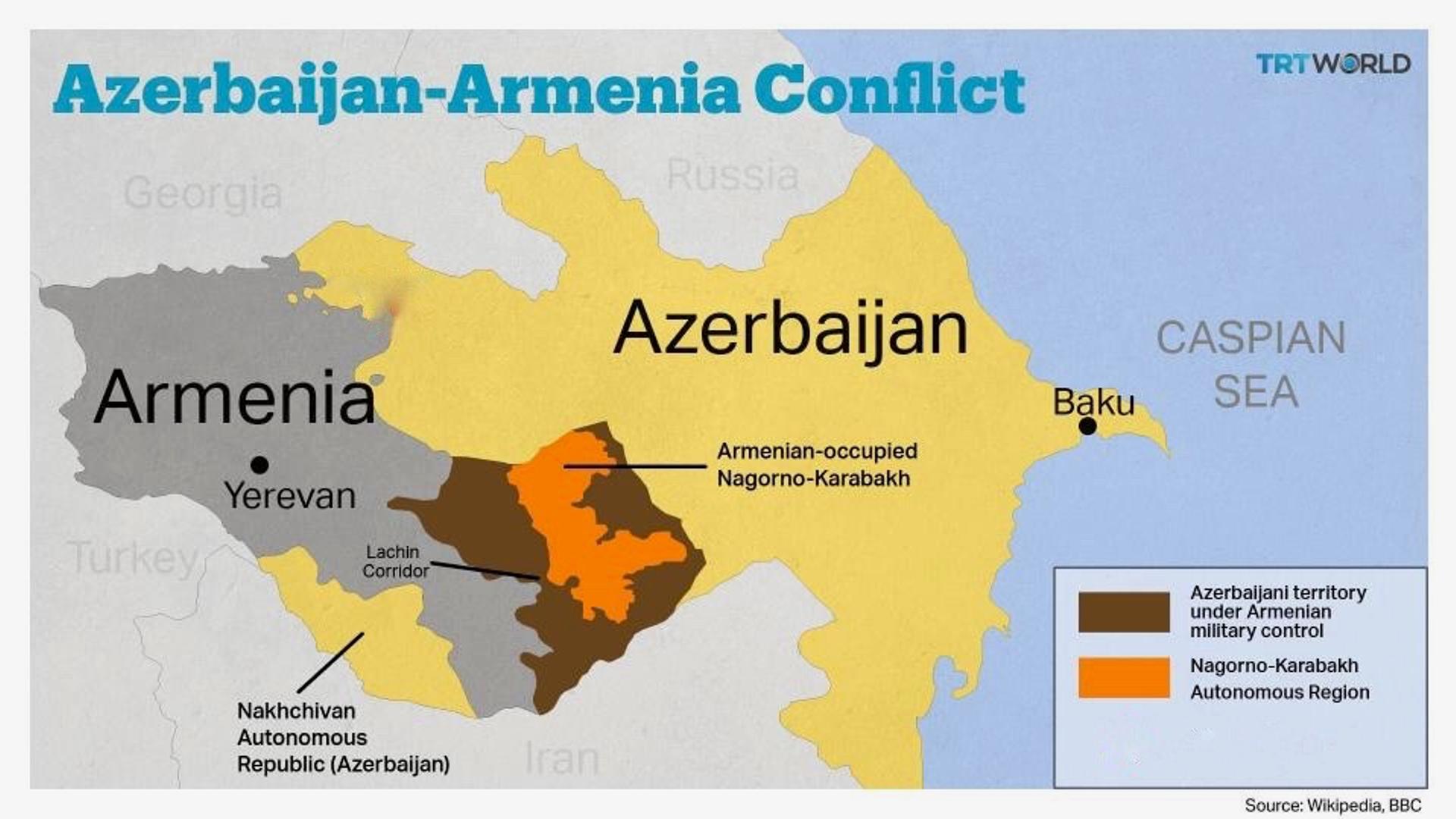
Several countries have called for an immediate end to hostilities as Baku and Yerevan put themselves on a war footing after heavy fighting along the frontlines of the Armenia-occupied Karabakh region, claiming military and civilian casualties on both sides.
The worst clashes on Sunday since 2016 have raised the spectre of a fresh war between the arch-enemies in the Caucasus which have been locked for decades in a territorial dispute over the region.
US, Turkey, Russia, France, Germany and the EU swiftly urged an “immediate ceasefire,” while Pope Francis prayed for peace.
US urges both sides to ‘cease hostilities’ immediately
The United States joined global calls for Armenia and Azerbaijan to end the deadly clashes.
The US State Department said it had contacted the two countries “to urge both sides to cease hostilities immediately, to use the existing direct communication links between them to avoid further escalation, and to avoid unhelpful rhetoric and actions.”
“The United States believes participation in the escalating violence by external parties would be deeply unhelpful and only exacerbate regional tensions,” the US statement added.
US President Donald Trump also commented on the matter by saying the US is looking at the violence between the two countries “very strongly” and it will seek to stop it.
Turkey: Armenia sending ‘region into the fire’
Turkey urged Armenia to immediately cease what it called hostility towards Azerbaijan that could “throw the region into the fire.”
“The biggest obstacle to peace and stability in the Caucasus is the hostile stance of Armenia and it must immediately turn back from this hostility that will send the region into the fire,” Turkish Defense Minister Hulusi Akar said, adding that Ankara would support Baku with “all its resources.”
Armenia declared martial law and mobilised its male population after the clashes. Turkey has condemned Armenia for what it said were provocations against Azerbaijan.
Turkey’s President Recep Tayyip Erdogan called on Armenian people to take hold of their future against the “leadership that is dragging them into a catastrophe.”
The Turkish Foreign Ministry in a statement promised: “However Azerbaijan wants, we will stand by Azerbaijan in that manner.”
There was no immediate reaction to Turkey’s comments from Armenia.
READ MORE: Azerbaijan ‘liberates’ Armenia-held villages as fighting rages
#Armenia continues to pose a serious threat to regional & intl peace, security & stability, thus necessitating the urgent action by intl community.
❗️Right of reply by the Delegation of #Azerbaijan to the statement by the Prime Minister of #Armenia at the #UNGA 75th session. pic.twitter.com/UUaIrxXarn
— MFA Azerbaijan (@AzerbaijanMFA) September 26, 2020
Martial law and General mobilization will be declared in #Armenia. @NikolPashinyan: I call on the personnel attached to the troops to report to their territorial military recruitment offices. For the sake of the homeland, for the sake of victory
— Government of Armenia (@armgov) September 27, 2020
UN calls for immediate end to fighting
UN Secretary-General Antonio Guterres said he was “extremely concerned over the fresh resumption of hostilities” between Armenia and Azerbaijan.
“The Secretary-General strongly calls on the sides to immediately stop fighting, de-escalate tensions and return to meaningful negotiations without delay,” Guterres’s spokesman said in a statement.
EU: ‘Military action must stop’
“Military action must stop, as a matter of urgency, to prevent a further escalation,” European Council president Charles Michel tweeted, calling for “an immediate return to negotiations, without preconditions”.
EU foreign policy chief Josep Borrell stressed the urgency of relaunching negotiations under the auspices of the so-called “Minsk Group”.
“The European Union calls for an immediate cessation of hostilities, de-escalation and for strict observance of the ceasefire,” he said.
France, Russia, and the US have mediated peace efforts as the “Minsk Group” but the last big push for a peace deal collapsed in 2010.
France calls for dialogue
France called on Yerevan and Baku to end hostilities and immediately restart dialogue.
“France is extremely concerned by the confrontation,” Foreign Ministry spokesperson Agnes von der Muhll said in a statement.
READ MORE: Turkey-Azerbaijan to hold joint military drill
We strongly condemn Armenia’s attack on Azerbaijan. Armenia has once again violated international law and shown that it has no interest in peace and stability.
Turkey stands in full solidarity with Azerbaijan and unreservedly supports its right to self-defense.
— Ibrahim Kalin (@ikalin1) September 27, 2020
Azerbaijan captures six Armenian-held villages in Karabakh fighting – ministry
— TRT World Now (@TRTWorldNow) September 27, 2020
Russia urges ceasefire
Russia’s Foreign Ministry, a mediator in decades of conflict between majority Christian Armenia and mainly Muslim Azerbaijan, urged both sides to cease fire immediately and hold talks.
“We are calling on the sides to immediately halt fire and begin talks to stabilise the situation,” the ministry said.
Russia FM Sergey Lavrov spoke with his Turkish counterpart Mevlut Cavusoglu, Moscow said, stressing “the need to halt fire as soon as possible.”
The two discussed “Armenia’s aggression,” a Turkish diplomatic source said.
Germany: ‘Immediately stop all hostilities’
“I call on both parties to the conflict to immediately stop all hostilities, especially the shelling of villages and towns,” German Foreign Minister Heiko Maas said in a statement, voicing “alarm” at reports of civilian casualties.
He urged a return to talks, saying that the Minsk Group “stood ready” to help.
READ MORE: Why Russia supports Armenia against Azerbaijan in the Caucasus conflict
READ MORE: The latest Armenia-Azerbaijan clashes are no coincidence
Iran ready to facilitate talks
Iran also called for an end to the fighting between arch-foes, and said it was ready to facilitate talks and a ceasefire between its two neighbours.
Iran “is closely following the military conflict between the republics of Azerbaijan and Armenia with concern,” Foreign Ministry spokesman Saeed Khatibzadeh said in a statement.
Tehran is ready “to use all of its capacities to establish ceasefire and start talks between the two sides”, he said and called for “an immediate end to the conflict”.
Pakistan ‘supports’ Azerbaijan’s right of self-defence
Pakistan said it is deeply concerned on the deteriorating security situation in the disputed region, and demanded Armenia cease all hostilities against Azerbaijan.
The intensive shelling by Armenian forces over the weekend on civilian populations of Azerbaijani villages of Terter, Aghdam, Fizuli and Jabrayil region is reprehensible and most unfortunate, Foreign Office spokesperson Zahid Hafeez Chaudhri said.
He said this could compromise peace and security of the entire region and Armenia must stop its military action to avoid further escalation.
The spokesperson said that Pakistan stands with the brotherly nation of Azerbaijan and “supports” its right of self-defence.
He said islamabad supports Azerbaijan’s position on occupied Karabakh, which it said is in line with the several unanimously adopted UN Security Council resolutions.
Instability in Caucasus
Pope Francis told crowds on Saint Peter’s Square he was praying for peace and called for “concrete gestures of goodwill and fraternity” from the warring sides.
Political observers said global powers should intensify talks to stop the conflict.
“We are a step away from a large-scale war,” Olesya Vartanyan of the International Crisis Group told AFP news agency.
“One of the main reasons for the current escalation is a lack of any proactive international mediation between the sides for weeks,” she added.
The two countries have long been at odds over occupied Karabakh since the collapse of the Soviet Union.
Though a ceasefire was agreed in 1994, Azerbaijan and Armenia frequently accuse each other of attacks around the region and along the separate Azeri-Armenian frontier.
The conflict has worried Western and regional countries in part because it could cause instability in the South Caucasus, which serves as a corridor for pipelines transporting oil and gas to world markets.
READ MORE: Why Azerbaijanis and Armenians have been fighting for so long










Discussion about this post